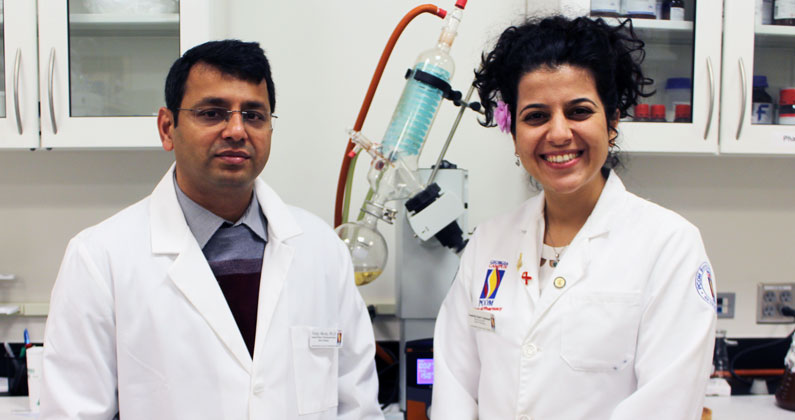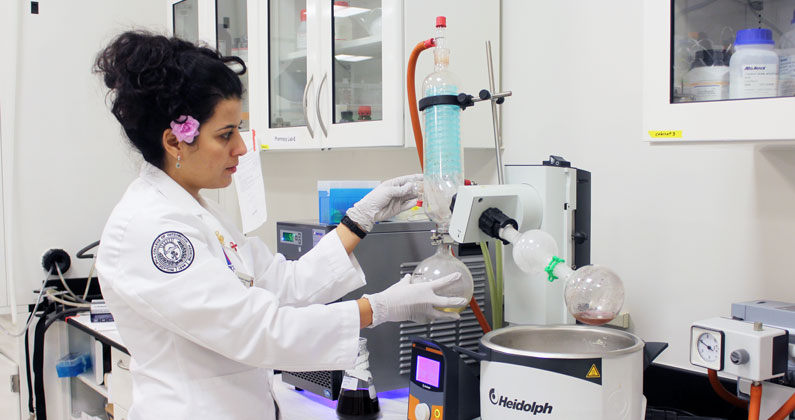Student Research Spotlight
Irandokht Khaki Najafabadi (PharmD '18)
November 28, 2017 Irandokht Khaki Najafabadi (PharmD ‘18) has worked on various research projects with
Vicky Mody, PhD.
Irandokht Khaki Najafabadi (PharmD ‘18) has worked on various research projects with
Vicky Mody, PhD.
Irandokht Khaki Najafabadi (PharmD ‘18) is currently a fourth-year student in the
PCOM School of Pharmacy at Georgia Campus – Philadelphia College of Osteopathic Medicine (GA-PCOM). She graduated
with a bachelor’s degree in biology and a master’s degree in developmental biology
from the University of Tehran in Iran. She hopes to become a faculty member after
completing her PharmD degree and a residency program.
What did you study?
I worked under the mentorship of Vicky Mody, PhD, associate professor of pharmaceutical sciences, on various research projects including
the development of a system to deliver xanthohumol to adipose tissues, and evaluating
the compatibility of norepinephrine bitartrate with various antibiotics for simulated
Y administration.
What prompted you to pursue research?
While I was pursuing my master’s degree, I had an opportunity to work in various research
projects with Dr. Bahman Zeynali in the basic science and pharmacy department. I enjoyed
my time doing research and it gave me immense pleasure to learn various experimental
procedures. Personally, I realized that I have a passion for research and I want to
carry out research in the field of health care.
What experience do you have with conducting research?
Fortunately, I received excellent opportunities to be involved in different research
projects. Some of the projects I have worked on previously include:
- Synthesis of various metal (Mn2+, Co3+, Ni3+) doped and undoped iron oxide nanoparticles, Supervisor: Dr. Mody, 2016, PCOM.
- In vitro and In vivo survey on the effect of Wnt-3a on osteogenic differentiation of unrestricted somatic
stem cells (USSCs), Supervisor: Dr. Zeynali, 2011, University of Tehran.
- Comparison survey for bone regeneration ability between active peptides derived from
camel and bovine casein proteins in rat, supervisor: Dr. Zeynali, 2009, school of
advanced medical technologies, Tehran University of Medical Sciences.

What were your responsibilities in the research project?
In my latest research project, I assisted in the:
- Development of two different kinds of nanoparticles. We developed ultra-small superparamagnetic
iron oxide nanoparticles (USPIO) and gold nanoparticles.
- Development of amine functionalized ultra-small superparamagnetic iron oxide nanoparticles
(USPIO-amine) and characterized by using ninhydrin assay
- Development of xanthohumol (XN) loaded USPIO-amine
- Evaluation of XN loading capacity of USPIO-amine by using HPLC and UV absorption spectroscopy.
Our main goal for this study was to synthesize these molecules, which will be selectively
targeted onto the specific tissues. USPIO are easy to synthesize and provide an advantage
in drug delivery where they can be used to target tissues due to their small size
or via the use of tissue specific ligands. Additionally, USPIO can be directed to
specific sites under the influence of an external magnetic field. Once these drug
loaded magnetic nanoparticles are injected into a patient, an external magnet can
be placed on the outside to attract drug loaded nanoparticles to the desired site
to attain a site specific therapeutic effect.
I had the opportunity to prepare a poster and present our research at GA-PCOM’s annual
Research Day in May. Recently our abstract was accepted for the poster presentation
at the ASHP Midyear Clinical Meeting & Exhibition to be held December 3-7, 2017.
What is the broader impact of your research?
Our work is still in progress. I really enjoyed developing nanoparticles. Nanotechnology
has found application in the targeted delivery of various molecules such as small-molecule
drugs, peptides, proteins and nucleic acids. The use of nanoparticles provides improved
pharmacokinetics and pharmacodynamics as it can increase the loading capacity of drugs
due to the increase in the surface area of small sized nanoparticles. I believe nanotechnology
is the future of medicine and the magic bullet as envisioned by Dr. Richard Feynman
in 1959. I feel fortunate to have had the opportunity to work under the mentorship
of Dr. Mody during my time as a PharmD student at GA-PCOM.
You May Also Like:
About PCOM Georgia
PCOM Georgia has been serving students and the community for 20 years as a branch campus of Philadelphia
College of Osteopathic Medicine (PCOM), a private, not-for-profit, accredited institution
of higher education established in 1899. Located in Suwanee (Gwinnett County), PCOM
Georgia offers doctoral degrees in osteopathic medicine, pharmacy and physical therapy.
Graduate degrees are offered in biomedical sciences, medical laboratory science and
physician assistant studies. The campus joins PCOM South Georgia in Moultrie in helping
to meet the healthcare needs of the state. Emphasizing "a whole person" approach to
care, PCOM Georgia focuses on educational excellence, interprofessional education
and service to the community. For more information, visit pcom.edu or call 678-225-7500. The campus is also home to the Georgia Osteopathic Care Center,
an osteopathic manipulative medicine clinic, which is open to the public by appointment.
For more information, visit pcomgeorgiahealth.org.
Contact Us
For general media inquiries, please contact the Office of Marketing and Communications
at 215-871-6300 or communications@pcom.edu. Visit our media relations page to view contact information for public relations personnel.
Connect with PCOM Georgia

 Irandokht Khaki Najafabadi (PharmD ‘18) has worked on various research projects with
Vicky Mody, PhD.
Irandokht Khaki Najafabadi (PharmD ‘18) has worked on various research projects with
Vicky Mody, PhD.
